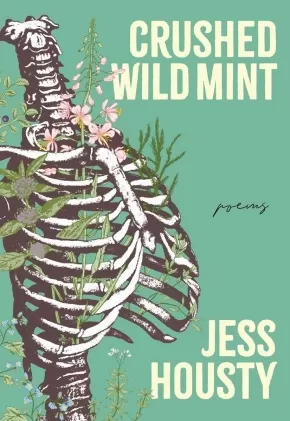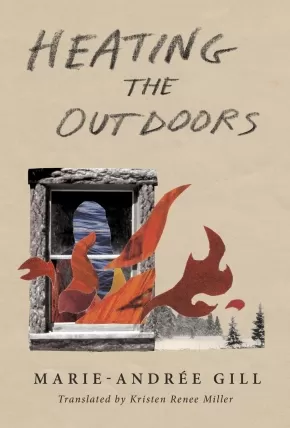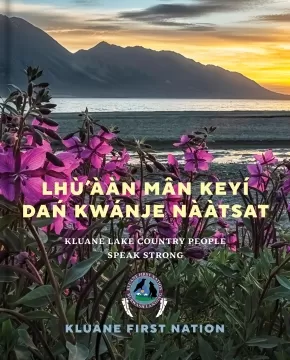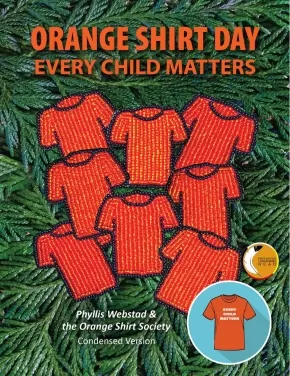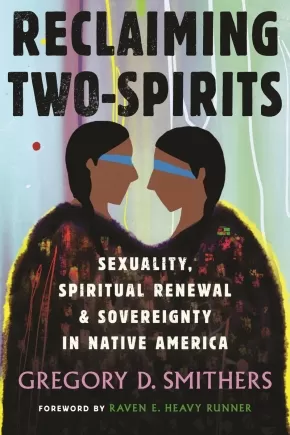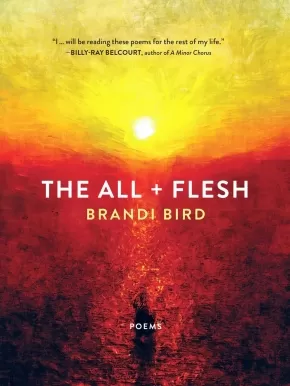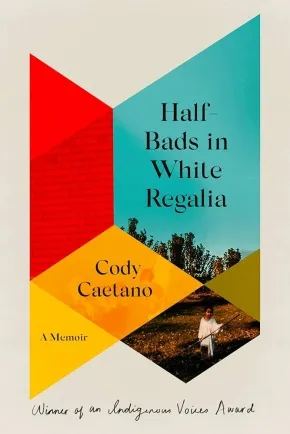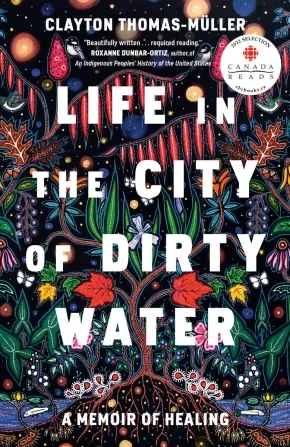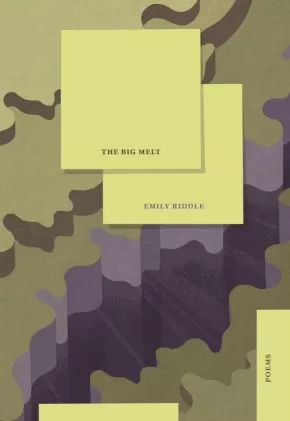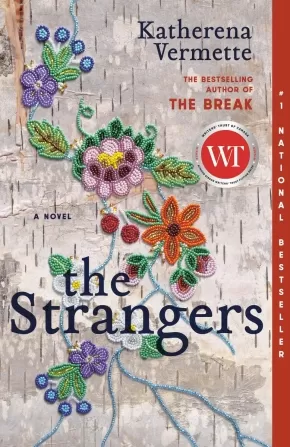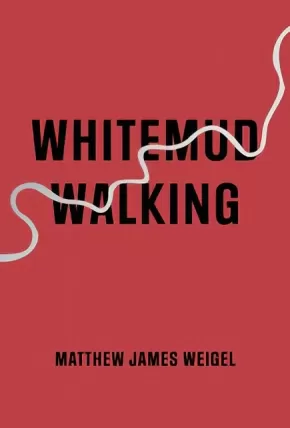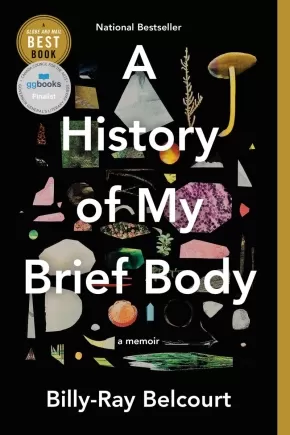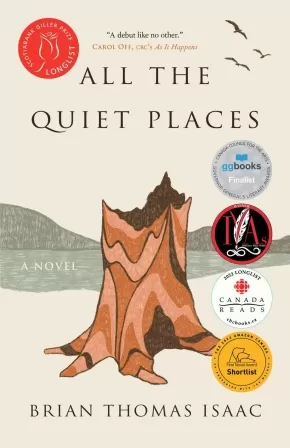
Award-Winning
16
-
30
of
83 Results;
Sort By
Go To
of 6
Carving Space: The Indigenous Voices Awards Anthology
$24.95
Editors:
Format:
Paperback
Text Content Territories:
Indigenous Canadian; Métis; Inuit; First Nations;
ISBN / Barcode: 9780771004858
Synopsis:
Synopsis:
To celebrate the fifth anniversary of the Indigenous Voices Awards, an anthology consisting of selected works by finalists over the past five years, edited by Jordan Abel, Carleigh Baker, and Madeleine Reddon.
For five years, the Indigenous Voices Awards have nurtured the work of Indigenous writers in lands claimed by Canada. Established in 2017 initially through a crowd-funded campaign by lawyer Robin Parker and author Silvia Moreno-Garcia that set an initial fundraising goal of $10,000, the initiative raised over $116,000 in just four months.
Through generous support from organizations such as Penguin Random House Canada, CELA, and others, the award has grown and have helped usher in a new and dynamic generation of Indigenous writers. Past IVA recipients include Billy-Ray Belcourt, Tanya Tagaq, and Jesse Thistle. The IVAs also help promote the works of unpublished writers, helping launch the careers of Smokii Sumac, Cody Caetano, and Samantha Martin-Bird.
For the first time, a selection of standout works over the past five years of the Indigenous Voices Award will be collected in an anthology that will highlight some of the most groundbreaking Indigenous writing across poetry, prose, and theatre in English, French, and in an Indigenous language. Curated by award-winning and critically acclaimed writers Carleigh Baker, Jordan Abel, and Indigenous scholar Madeleine Reddon, this anthology will be a true celebration of Indigenous storytelling that will both introduce readers to emerging luminaries as well as return them to treasured favourites.
Educator Information
Carving Space: The Indigenous Voices Awards Anthology: A collection of prose and poetry from emerging Indigenous writers in lands claimed by Canada includes a selection of standout work from the first five years of the Indigenous Voices Awards.
Additional Information
400 pages | 5.50" x 8.25" | Paperback
Crushed Wild Mint
$19.95
Format:
Paperback
Text Content Territories:
Indigenous Canadian; First Nations; Heiltsuk (Bella Bella);
Reading Level: N/A
ISBN / Barcode: 9780889714502
Synopsis:
Synopsis:
Crushed Wild Mint is a collection of poems embodying land love and ancestral wisdom, deeply rooted to the poet’s motherland and their experience as a parent, herbalist and careful observer of the patterns and power of their territory. Jess Housty grapples with the natural and the supernatural, transformation and the hard work of living that our bodies are doing—held by mountains, by oceans, by ancestors and by the grief and love that come with communing.
Housty’s poems are textural—blossoms, feathers, stubborn blots of snow—and reading them is a sensory offering that invites the reader’s whole body to be transported in the experience. Their writing converses with mountains, animals and all our kin beyond the human realm as they sit beside their ancestors’ bones and move throughout the geography of their homeland. Housty’s exploration of history and futurity, ceremony and sexuality, grieving and thriving invites us to look both inward and outward to redefine our sense of community.
Through these poems we can explore living and loving as a practice, and placemaking as an essential part of exploring our humanity and relationality.
Awards
- 2024 Bill Duthie Booksellers’ Choice Award winner
- 2024 Dorothy Livesay Poetry Award winner
Reviews
"When the mountains of your territory are your ancestors, you paint the landscapes as Jess Housty does in this evocative, powerful collection of poetry: in the language of ceremony as taut as the inner surface of a mussel shell when the meat is stripped away. Their hyperlocality is precise medicine, an expansive, generous meditation on the mutual care of mountains, the forgiving veins of rivers, all the liminal territories and beings soaked in the verdant magic of the Pacific Northwest Coast." — Eden Robinson
"I return to read and then stop to wonder, return to read and still wonder: How is this so true? Let these words love you. They’ll sing." — Michael Nicoll Yahgulanaas
Additional Information
132 pages | 5.50" x 8.00" | Paperback
Heating the Outdoors
$20.00
Format:
Paperback
Text Content Territories:
Indigenous Canadian; First Nations; Innu (Montagnais-Naskapi); Mashteuiatsh (Pekuakamiulnuatsh);
Reading Level: N/A
ISBN / Barcode: 9781771668149
Synopsis:
Synopsis:
You're the clump of blackened spruce
that lights my gasoline-soaked heart
It's just impossible you won't be back
to quench yourself in my crème-soda
ancestral spirit
Irreverent and transcendent, lyrical and slang, Heating the Outdoors is an endlessly surprising new work from award-winning poet Marie-Andrée Gill.
In these micropoems, writing and love are acts of decolonial resilience. Rooted in Nitassinan, the territory and ancestral home of the Ilnu Nation, they echo the Ilnu oral tradition in Gill's interrogation and reclamation of the language, land, and interpersonal intimacies distorted by imperialism. They navigate her interior landscape—of heartbreak, humor, and, ultimately, unrelenting light—amidst the boreal geography.
Heating the Outdoors describes the yearnings for love, the domestic monotony of post-breakup malaise, and the awkward meeting of exes. As the lines between interior and exterior begin to blur, Gill's poems, here translated by Kristen Renee Miller, become a record of the daily rituals and ancient landscapes that inform her identity not only as a lover, then ex, but also as an Ilnu and Québécoise woman.
Awards
- 2020 Indigenous Voices Award for Best Published Poetry in French winner. This book is the translated version in English.
Reviews
"I'm literally captivated by the accuracy, the beauty. They taste of honey, these poems." —Karine Villeneuve, bookseller, Page par Page
"Heating the Outdoors is a stunning collection exploring heartbreak, and the awkward dance between exes from the positionality of an Ilnu and Québécoise woman whose poetic 'gasoline-soaked heart' yearns deeply for love. Translated by Kristen Renee Miller from French into English, Gill's Heating the Outdoors re-wilds the ritualistic humdrum of domestic life while honouring the land and her 'crème-soda ancestral spirit.'" —Shannon Webb-Campbell, author of Lunar Tides and I Am a Body of Land
"These poems live in a bachelor apartment over the corner store. They're on the bus looking out at the muddy hangtime between winter and spring, in a too-warm jacket. These poems will make you a cup of tar-coffee and tell you about the ache of desire in the language of crunching snow. You'll come back to them over and over again to listen." —Carleigh Baker, author of Bad Endings
“Marie-Andrée Gill’s spare, luminous micropoems are endlessly surprising, twisting out, into, and unto themselves like complicated lovers. Defiantly fragmentary, these are stunning shards of tongues, embodied vernaculars slowly, steadily unsettling grammars. Kristen Renee Miller’s translations retain the elegance and shimmer of the originals while wondrously conveying their knottedness, their syntax of skin. When at last we reach Nitassinan, we are reminded of the worlds poetry documents, but also of the worlds it creates. This is poetry that claims the power to 'gnaw the meat off each day and spit out the pin bones' through a language as unresolved as our decolonial dreams and as necessary as our sovereign desires.” —Urayoán Noel, author of Transversal
Additional Information
98 pages | 5.25" x 7.75" | Paperback
Lhù’ààn Mân Keyí Dań Kwánje Nààtsat: Kluane Lake Country People Speak Strong
$55.00
Format:
Hardcover
Text Content Territories:
Indigenous Canadian; First Nations; Tutchone; Southern Tutchone; Kluane First Nation;
Reading Level: N/A
ISBN / Barcode: 9781773272061
Synopsis:
Synopsis:
In this poignant display of the resilience of language, culture, and community in the face of the profound changes brought by settlers, Kluane First Nation Elders share stories from their lives, knowledge of their traditional territory (A si Keyi, "my grandfather's country"), and insights on the building of their self-governing First Nation.
With generosity, diligence and deep commitment to their community, Elders from Lhu'aan Man Keyi (Kluane First Nation) recorded oral histories about their lives in the southwest Yukon. They shared wisdom, stories and songs passed down from grandparents, aunties and uncles, in Dan k'e (Southern Tutchone, Kluane dialect) and English. This years-long project arose from the Elders' desire for their children and future generations to know the foundations of language, culture, skills and beliefs that will keep them proud, healthy and strong. The Elders speak of life before the Alaska Highway, when their grandparents drew on thousands of years of traditional knowledge to live on the land through seasonal rounds of hunting and gathering; the dark years after the building of the Alaska Highway, when children were taken away to residential schools and hunting grounds were removed to form the Kluane Game Preserve and National Park; and the decades since, when the community worked through the Yukon land claims process to establish today's self-governing First Nation.
Inclusivity is a key community value. The Elders' stories are accompanied by the voices of youth and citizens of all ages, along with a history of the Kluane region. The book is beautifully illustrated with Elders' photographs, historical images and art work, and photos showing breathtaking views of Kluane mountains, lakes, sites, trails, and activities in the community today. With passionate and deeply informed voices, this is a stirring portrait created by a community that has shown resilience through massive changes and remains dedicated to preserving their culture, language and lands for the generations to come.
Awards
- 2024 Indigenous History Book Prize
Educator Information
Some of the wisdom, stories, and songs are in Dan k'e (Southern Tutchone, Kluane dialect).
Additional Information
384 pages | 11.25" x 9.00"| 150 colour and b&w photos | Hardcover
Orange Shirt Day: Every Child Matters: Condensed Edition
$19.99
Format:
Paperback
Text Content Territories:
Indigenous Canadian; First Nations; Inuit; Métis;
ISBN / Barcode: 9781778540158
Synopsis:
Synopsis:
A special abridged version of the award-winning book Orange Shirt Day: September 30th.
Orange Shirt Day, observed annually on September 30th, is also known as the National Day for Truth and Reconciliation. It is an official day to honour Residential School Survivors and their families, and to remember the children who did not come home. What was initially envisioned as a way to keep the conversations going about all aspects of Residential Schools in Williams Lake and the Cariboo Region of British Columbia, Canada, has now expanded into a movement across Turtle Island and beyond.
Orange Shirt Day: Every Child Matters aims to create champions who will walk a path of reconciliation and promote the message that 'Every Child Matters'. This version also explores a number of important topics including the historical, generational, and continual impacts of Residential Schools on Indigenous Peoples, the journey of the Orange Shirt Day movement, and how you can effectively participate in the National Day for Truth and Reconciliation. With end-of-chapter reflection questions and a series of student art submissions, readers are guided to explore how they, and others, view and participate in Residential School reconciliation.
Educator Information
Recommended for Young Adults (ages 10+)
This is an abridged version (condensed version) of Orange Shirt Day: September 30th.
This book is available in French: La journee du chandail orange: Chaque enfant compte
Additional Information
108 pages | 8.50" x 11.00" | Paperback
Orange Shirt Day: September 30th: Revised Edition
$32.99
Format:
Hardcover
Text Content Territories:
Indigenous Canadian; First Nations; Inuit; Métis;
ISBN / Barcode: 9781778540141
Synopsis:
Synopsis:
Orange Shirt Day, observed annually on September 30th, is also known as the National Day for Truth and Reconciliation. It is an official day to honour Residential School Survivors and their families, and to remember the children who did not come home. What was initially envisioned as a way to keep the conversations going about all aspects of Residential Schools in Williams Lake and the Cariboo Region of British Columbia, Canada, has now expanded into a movement across Turtle Island and beyond. Orange Shirt Day: September 30th aims to create champions who will walk a path of reconciliation and promote the message that 'Every Child Matters'. This award-winning book explores a number of important topics including the historical, generational, and continual impacts of Residential Schools on Indigenous Peoples, the journey of the Orange Shirt Day movement, and how you can effectively participate in the National Day for Truth and Reconciliation. With end of chapter reflection questions and a series of student art submissions, readers are guided to explore how they, and others, view and participate in Residential School reconciliation.
Awards
- 2021 First Nation Communities Read 2021 Winner
Educator Information
Recommended Ages: 10+
Orange Shirt Day was inspired by the story of a survivor named Phyllis Webstad. When Phyllis was 6 years old she went to residential school for the first time wearing a brand new shiny orange shirt. When she arrived at the school her shirt was taken away and never to be seen again. To Phyllis the colour orange was a symbol that she did not matter. Today she has learned to accept the colour and even have fun with it and now the orange shirt has become a symbol of hope and reconciliation. By wearing an orange shirt on Orange Shirt Day, you make a powerful statement that residential schools were wrong and commit to the concept that EVERY CHILD MATTERS.
The Orange Shirt Society is a non-profit organization with its home in Williams Lake, BC where Orange Shirt Day began in 2013. The society has both Indigenous and non-Indigenous board members, and one of the editors of this book, Phyllis Webstad, is Indigenous. Therefore, the Authentic Indigenous Text label has been applied. It is up to readers to determine if this book is authentic for their purposes.
This is the Revised 2023, 2nd Edition
Additional Information
156 pages | 8.23" x 11.06" | Revised, 2nd Edition
Reclaiming Two-Spirits: Sexuality, Spiritual Renewal & Sovereignty in Native America (PB)
$28.95
Format:
Paperback
Text Content Territories:
Indigenous American; Native American;
Reading Level: N/A
ISBN / Barcode: 9780807008195
Synopsis:
Synopsis:
A sweeping history of Indigenous traditions of gender, sexuality, and resistance that reveals how, despite centuries of colonialism, Two-Spirit people are reclaiming their place in Native nations.
Reclaiming Two-Spirits decolonizes the history of gender and sexuality in Native North America. It honors the generations of Indigenous people who had the foresight to take essential aspects of their cultural life and spiritual beliefs underground in order to save them.
Before 1492, hundreds of Indigenous communities across North America included people who identified as neither male nor female, but both. They went by aakíí’skassi, miati, okitcitakwe, or one of hundreds of other tribally specific identities. After European colonizers invaded Indian Country, centuries of violence and systematic persecution followed, imperiling the existence of people who today call themselves Two-Spirits, an umbrella term denoting feminine and masculine qualities in one person.
Drawing on written sources, archaeological evidence, art, and oral storytelling, Reclaiming Two-Spirits spans the centuries from Spanish invasion to the present, tracing massacres and inquisitions and revealing how the authors of colonialism’s written archives used language to both denigrate and erase Two-Spirit people from history. But as Gregory Smithers shows, the colonizers failed—and Indigenous resistance is core to this story. Reclaiming Two-Spirits amplifies their voices, reconnecting their history to Native nations in the 21st century.
Reviews
“Reclaiming Two-Spirits is by far the most compelling study to date of an evolving tradition and way of life that has always operated according to a cultural logic of its own and that we can appreciate fully only by taking that cultural logic seriously. Setting aside Anglo-American assumptions and categories, Smithers has listened closely to Two-Spirit people in the present and to traces of their voices in historical sources. This book is a major contribution to our understanding of Native American cultures and to an authentically diverse history of gender and sexuality.” —Richard Godbeer, author of Sexual Revolution in Early America
“From the onset of colonization until well into the present, the discourse and histories of Two-Spirit Indigenous peoples remains a puzzle for Indigenous and non-Indigenous people alike. Reclaiming Two-Spirits will help you solve that puzzle. Using familiar and obscure stories, Smithers skillfully reveals the centrality of Two-Spirit struggles within the matrix of settler colonial domination and the Indigenous struggle for freedom. He reveals the destructive nature of colonial violence and the possibilities of a Two-Spirit future. An original contribution to Indigenous cultural and intellectual histories, an understanding of the links between language and power, and Indigenous futures, this book will not only educate your mind, but will also touch your spirit.” —Kyle T. Mays (Black/Saginaw Chippewa), author of An Afro-Indigenous History of the United States
Awards
- Winner of the 2023 Prose Award in Cultural Anthropology and Sociology
Additional Information
368 pages | 5.97" x 9.01" | Paperback
The All + Flesh: Poems
$19.99
Format:
Paperback
Text Content Territories:
Indigenous Canadian; First Nations; Anishinaabeg; Ojibway; Saulteaux; Cree (Nehiyawak); Métis;
Reading Level: N/A
ISBN / Barcode: 9781487011826
Synopsis:
Synopsis:
Brandi Bird's frank, transcendent poetry explores the concepts of health, language, place, and memory in this long-anticipated debut collection.
Brandi Bird's long-anticipated debut poetry collection, The All + Flesh, explores the concepts of health, language, place, and memory that connect its author to their chosen kin, blood relatives, and ancestral lands. By examining kinship in broader contexts, these frank, transcendent poems expose binaries that exist inside those relationships, then inspect and tease them apart in the hope of moving toward decolonial future(s). Bird's work is highly concerned with how outer and inner landscapes move and change within the confines of the English language, particularly the "I" of the self, a tradition of movement that has been lost for many who don't speak their Indigenous languages or live on their homelands. By exploring the landscapes the poet does inhabit, both internally and externally, Bird's poems seek to delve into and reflect their cultural lineages-specifically Saulteaux, Cree, and Métis-and how these transformative identities shape the person they are today.
I am made of centuries & carbohydrates
the development of my molars
the hunger the teeth grew
has been with me since childhood
I can't escape the mouths of others
Awards
- 2024 Poetry in English, Indigenous Voices Awards
Reviews
"Since hearing Brandi Bird at a reading in a park in summertime recite the lines, "I know / then that there is hope / until I die & then / there is other / people's hope," I have thought about them many times, they have merged with my own consciousness. That's the power of Bird's poems-they resonate at such a visceral and cerebral level that they become a part of you. The All + Flesh marks the arrival of an endlessly moving and astounding voice in Indigenous poetry. I, for one, will be reading these poems for the rest of my life." — Billy-Ray Belcourt, author of A MINOR CHORUS
"In The All + Flesh, Brandi Bird maps the psychic space between 'NDN compartmentalization' and split prairies, from bus depots to 'endocrine storms,' from LiveJournal to a living history of relocation under land theft. 'My body is not an empire but first contact happened at / birth' and 'I eat / until my mouth needles / the dark.' With exacting lucidity, Bird's lyrics chart the body as a reservoir for colonial malice, a site of resistance, and a conduit for a voice that is visceral, immediate, and uncompromising. An absolute triumph of a debut."— Liz Howard, author of Letters in a Bruised Cosmos
"A stunning collection with carefully crafted, searing poems that refuse artifice, indirectness, and voyeurism. Brandi Bird writes the experience of illness and Indigeneity into a world that accepts illness only if it perpetuates colonial beauty and body standards, then interrogates the racist systems that disallow care and compassion for Indigenous people. These poems are tender and surprising; they are holes travelling through time and space. They are able to shapeshift God into pills, prayers, seeds, and stars. The All + Flesh has taken root in my mind and I'm happy to let it grow there." — Jessica Johns, author of Bad Cree
Additional Information
96 pages | 6.00" x 8.00" | Paperback
Half-Bads in White Regalia: A Memoir
$24.95
Format:
Paperback
Text Content Territories:
Indigenous Canadian; First Nations; Anishinaabeg;
Grade Levels: 12; University/College;
ISBN / Barcode: 9780735240858
Synopsis:
Synopsis:
A family tries to learn from the mistakes of past generations in this whirlwind memoir from a wholly original new voice.
The Caetanos move into a doomed house in the highway village of Happyland before an inevitable divorce pulls Cody’s parents in separate directions. His mom, Mindimooye, having discovered her Anishinaabe birth family and Sixties Scoop origin story, embarks on a series of fraught relationships and fresh starts. His dad, O Touro, a Portuguese immigrant and drifter, falls back into “big do, little think” behaviour, despite his best intentions.
Left alone at the house in Happyland, Cody and his siblings must fend for themselves, even as the pipes burst and the lights go out. His protective big sister, Kris, finds inventive ways to put food on the table, and his stoic big brother, Julian, facilitates his regular escapes into the world of video games. As life yanks them from one temporary solution to the next, they steal moments of joy and resist buckling under “baddie” temptations aplenty.
Capturing the chaos and wonder of a precarious childhood, Cody Caetano delivers a fever dream coming-of-age garnished with a slang all his own. Half-Bads in White Regalia is an unforgettable debut that unspools a tangled family history with warmth, humour, and deep generosity.
Awards
- 2023 Indigenous Voices Awards Winner: Published Prose in English
Reviews
“Memoirs are a difficult alchemy of testimony and confession, scene-making and character-building. They have to soften the hard things and show the way through at every turn—or at least they should—and that’s what Cody Caetano does in Half-Bads in White Regalia. No one gets off easy, but everyone is drawn with unflinching love and respect. Nothing seems wholly remarkable, yet everything is turned to see its beauty. Poetry permeates this prose, poetry and this wholly unique voice and style that somehow made me laugh and cry often, and in the oddest places. Read it. You won’t regret it. Telling you.”—Katherena Vermette, author of The Strangers
“A brilliant and devastating debut. This book hurtles towards difficult understandings about love and violence and family. At times I didn’t know whether I should laugh or cry, but Caetano fills each moment with such character and humanity that it’s impossible not to fall in love.” —Jordan Abel, author of NISHGA
Additional Information
280 pages | 5.62" x 8.25" | Paperback
Life in the City of Dirty Water: A Memoir of Healing (PB)
$19.95
Format:
Paperback
Text Content Territories:
Indigenous Canadian; First Nations; Cree (Nehiyawak); Swampy Cree ; Mathias Colomb First Nation;
ISBN / Barcode: 9780735240087
Synopsis:
Synopsis:
An electrifying memoir that braids together the urgent issues of Indigenous rights and environmental policy, from a nationally and internationally recognized activist and survivor.
There have been many Clayton Thomas-Mullers: The child who played with toy planes as an escape from domestic and sexual abuse, enduring the intergenerational trauma of Canada's residential school system; the angry youngster who defended himself with fists and sharp wit against racism and violence, at school and on the streets of Winnipeg and small-town British Columbia; the tough teenager who, at 17, managed a drug house run by members of his family, and slipped in and out of juvie, operating in a world of violence and pain.
But behind them all, there was another Clayton: the one who remained immersed in Cree spirituality, and who embraced the rituals and ways of thinking vital to his heritage; the one who reconnected with the land during summer visits to his great-grandparents' trapline in his home territory of Pukatawagan in northern Manitoba.
And it's this version of Clayton that ultimately triumphed, finding healing by directly facing the trauma that he shares with Indigenous peoples around the world. Now a leading organizer and activist on the frontlines of environmental resistance, Clayton brings his warrior spirit to the fight against the ongoing assault on Indigenous peoples' lands by Big Oil.
Tying together personal stories of survival that bring the realities of the First Nations of this land into sharp focus, and lessons learned from a career as a frontline activist committed to addressing environmental injustice at a global scale, Thomas-Muller offers a narrative and vision of healing and responsibility.
Reviews
“Clayton Thomas-Müller—Cree poet and environmental warrior dedicated to decolonization—has crafted an awesome, lyrical memoir that captures the experiences of urban Indigenous youth facing poverty, drugs, alcohol, domestic violence, and juvenile detention. Most, like Clayton, inherited the intergenerational trauma of residential schools. Clayton found a way to escape trauma and poverty in order to fight for his people. This beautifully written book is required reading for everyone who cares about justice for the survivors of genocide who continue to survive in colonized conditions. It offers a path to liberation that may also be the way to saving the earth and humanity itself.” — Roxanne Dunbar-Ortiz, author of An Indigenous Peoples’ History of the United States
“This book is an adventure story in every way. A life of drug dealers and crackhouses and guns; leaving that behind for a remarkable time of spiritual and personal growth; and there’s the ongoing adventure of working desperately to protect the planet and its sacred places. Clayton Thomas-Müller relates these adventures in ways that will help everyone through unfamiliar terrain—he’s a trustworthy guide and an authentic storyteller. In a moment when Indigenous people around the world are coming to the very fore of the most crucial fights, this volume will broaden your understanding in powerful ways. And you won’t forget its scenes any time soon.”—Bill McKibben, co-founder of 350.org and author of Earth and Oil and Honey
Additional Information
240 pages | 5.19" x 7.97" | Paperback
The Big Melt
$19.95
Format:
Paperback
Text Content Territories:
Indigenous Canadian; First Nations; Cree (Nehiyawak); Plains Cree; Alexander First Nation (Kipohtakaw);
Reading Level: N/A
ISBN / Barcode: 9780889714366
Synopsis:
Synopsis:
The Big Melt is a debut poetry collection rooted in nehiyaw thought and urban millennial life events. It examines what it means to repair kinship, contend with fraught history, go home and contemplate prairie ndn utopia in the era of late capitalism and climate change. Part memoir, part research project, this collection draws on Riddle’s experience working in Indigenous governance and her affection for confessional poetry in crafting feminist works that are firmly rooted in place. This book refuses a linear understanding of time in its focus on women in the author’s family, some who have passed and others who are yet to come. The Big Melt is about inheriting a Treaty relationship just as much as it is about breakups, demonstrating that governance is just as much about our interpersonal relationships as it is law and policy. How does one live one’s life in a way that honours inherited responsibilities, a deep love for humour and a commitment to always learning about the tension between a culture that deeply values collectivity and the autonomy of the individual? Perhaps we find these answers in the examination of ourselves, the lands we are from and the relationships we hold.
Awards
- 2023 Indigenous Voices Awards Co-Winner for Published Poetry in English
Reviews
"Gentle, firm and funny, Emily Riddle uses The Big Melt to Aunty us all. This radically personal debut, like an iceberg or crater on the moon, reaches deep down into history—political, familial, environmental, romantical—to make sense of what it means to be an ndn on the prairies today who understands that the Oilers and West Edmonton Mall and miniskirts are sacred, and that this “bootlegging operation called Canada” can’t stop telling lies. There are truths here for us; the immense research behind the text feels like a lifetime labour of love, done out of necessity to reconcile loss and fashion some comfort in the face of colonial violence. What a gift it is for Riddle to show us, with clarity and wit, how fierce friendship and unshakeable matriarchs have helped her to connect with her ancestors, nehiyaw askiy, and herself." — Molly Cross-Blanchard, August 2022
"It is a thrill to read the work of a writer so generously astute and playful in their poetics. In The Big Melt, Emily Riddle calls us to attention, reciprocity and place with wisdom and tenderness. These poems return us to course, reminding us what it means to live connected to one another through Treaty and through care, before turning with a sly wink to expose the irony, the insecurity and the impermanence of settler colonialism. Deeply funny and conscious, The Big Melt roots us here together, asks us to hold on to one another, and to go on." — Jason Purcell, August 2022
"Emily Riddle's The Big Melt is an integral and intersectional addition to the Indigenous poetic arena and enters adorned with historic seedling and contemporary sapling. Riddle positions herself between Vancouver and Edmonton and untangles the breathing ecosystem of ancestor and knowledge that lie beyond the “depth of a plow.” Her poetics are aglow with unceded prairie treaties and decolonial praxes; here, buried settlers become “ndn land itself” and askiy is always animate—a becoming and an oncoming. We are continually reminded of the breadth of kin we are in relation with—she animates the land as being, allowing it to speak, and never forgoes its desires. From within burial trees, nehiyawewin emerges, from within the personal enters the political, and from within such a melting we find a series of unearthed birthings. Riddle never lets us forget that “the most important intimacies are never spectacular” but rather they are beyond any singular compound noun that English surely stole." — Joshua Whitehead, August 2022
"Emily Riddle's collection, The Big Melt, reads like a love letter to the prairies, Indigenous identity, heritage and love (both lost and found). In language both sharp and accessible, with no need to obfuscate with metaphor, Riddle reminds us that love letters are also written to cut deep when they must, to push back and to complicate, while demanding all the parts of us be seen. This is a collection for everyone who wants a little reality (and McDonald’s) with their rebellion." — Rayanne Haines, August 2022
Additional Information
112 pages | 5.50" x 8.00" | Paperback
The Strangers (PB)
$22.00
Format:
Paperback
Text Content Territories:
Indigenous Canadian; Métis;
ISBN / Barcode: 9780735239630
Synopsis:
Synopsis:
From the bestselling author of The Break comes a staggering intergenerational saga that explores how connected we are, even when we’re no longer together—even when we’re forced apart.
Cedar has nearly forgotten what her family looks like. Phoenix has nearly forgotten what freedom feels like. And Elsie has nearly given up hope. Nearly.
After time spent in foster homes, Cedar goes to live with her estranged father. Although she grapples with the pain of being separated from her mother, Elsie, and sister, Phoenix, she’s hoping for a new chapter in her life, only to find herself once again in a strange house surrounded by strangers. From a youth detention centre, Phoenix gives birth to a baby she’ll never get to raise and tries to forgive herself for all the harm she’s caused (while wondering if she even should). Elsie, struggling with addiction and determined to turn her life around, is buoyed by the idea of being reunited with her daughters and strives to be someone they can depend on, unlike her own distant mother. These are the Strangers, each haunted in her own way. Between flickering moments of warmth and support, the women diverge and reconnect, fighting to survive in a fractured system that pretends to offer success but expects them to fail. Facing the distinct blade of racism from those they trusted most, they urge one another to move through the darkness, all the while wondering if they’ll ever emerge safely on the other side.
A breathtaking companion to her bestselling debut The Break, Vermette’s The Strangers brings readers into the dynamic world of the Stranger family, the strength of their bond, the shared pain in their past, and the light that beckons from the horizon. This is a searing exploration of race, class, inherited trauma, and matrilineal bonds that—despite everything—refuse to be broken.
Reviews
“Katherena Vermette’s The Strangers is a deeply moving story of how colonial institutions continue to bear down on and disrupt the lives of Indigenous women and girls. It is a powerful collective portrait of struggle and resistance, of what it’s like to be in an Indigenous body in twenty-first century Canada. In the end, it adds up to an engrossingly written ode to another kind of care, one against the grain of suffering. A brilliant follow-up!”—Billy-Ray Belcourt, bestselling author of A History of My Brief Body
“The Strangers is a unique and essential triumph of a novel. It is revelatory in its artistry—in its constellating of family against violent separation, in its austere poetics of voice and consciousness. Katherena Vermette has proven once again that she is among the most gifted and relevant writers of our time: someone with everything to teach us about the telling of necessary stories, about grieving the fallen, honouring survival, and revealing the fiercest beauty.” —David Chariandy, award-winning author of Brother and I’ve Been Meaning to Tell You
Additional Information
352 pages | 5.10" x 7.90" | Paperback
Whitemud Walking
$23.95
Format:
Paperback
Text Content Territories:
Indigenous Canadian; First Nations; Dene; Métis;
Reading Level: N/A
ISBN / Barcode: 9781552454411
Synopsis:
Synopsis:
An Indigenous resistance historiography, poetry that interrogates the colonial violence of the archive
Whitemud Walking is about the land Matthew Weigel was born on and the institutions that occupy that land. It is about the interrelatedness of his own story with that of the colonial history of Canada, which considers the numbered treaties of the North-West to be historical and completed events. But they are eternal agreements that entail complex reciprocity and obligations. The state and archival institutions work together to sequester documents and knowledge in ways that resonate violently in people’s lives, including the dispossession and extinguishment of Indigenous title to land.
Using photos, documents, and recordings that are about or involve his ancestors, but are kept in archives, Weigel examines the consequences of this erasure and sequestration. Memories cling to documents and sometimes this palimpsest can be read, other times the margins must be centered to gain a fuller picture. Whitemud Walking is a genre-bending work of visual and lyric poetry, non-fiction prose, photography, and digital art and design.
Awards
- 2023 Indigenous Voices Awards Co-Winner: Published Poetry in English
Additional Information
144 pages | 5.75" x 8.50" | Paperback
A History of My Brief Body (PB)
$19.95
Format:
Paperback
Text Content Territories:
Indigenous Canadian; First Nations; Cree (Nehiyawak); Woodland Cree; Woods Cree; Driftpile First Nation;
Grade Levels: University/College;
ISBN / Barcode: 9780735237803
Synopsis:
Synopsis:
A slim but electrifying debut memoir about the preciousness and precariousness of queer Indigenous life.
Opening with a tender letter to his kokum and memories of his early life on the Driftpile First Nation, Billy-Ray Belcourt delivers a searing account of Indigenous life that’s part love letter, part rallying cry.
With the lyricism and emotional power of his award-winning poetry, Belcourt cracks apart his history and shares it with us one fragment at a time. He shines a light on Canada’s legacy of colonial violence and the joy that flourishes in spite of it. He revisits sexual encounters, ruminates on first loves and first loves lost, and navigates the racial politics of gay hookup apps. Among the hard truths he distills, the outline of a brighter future takes shape.
Bringing in influences from James Baldwin to Ocean Vuong, this book is a testament to the power of language—to devastate us, to console us, to help us grieve, to help us survive. Destined to be dog-eared, underlined, treasured, and studied for years to come, A History of My Brief Body is a stunning achievement from one of this generation’s finest young minds.
Awards
- Winner of the Hubert Evans Non-Fiction Prize
Reviews
“Bursting with all the movements of sex, riot, and repose, this book presents us with a shock of recognition and reclamation, and we are better for it―punch drunk and aching but, oh, so much better. I’m gutted by his brilliant mind.” ―Cherie Dimaline
“Displays a pervading lucidity, akin to dreaming while standing wide awake, feet firmly on the soil . . . [A] fascinating exploration of the impact of colonialism in all its ramifications.” —Quill & Quire
Additional Information
192 pages | 5.01" x 7.50" | Paperback
All the Quiet Places: A Novel
$24.00
Format:
Paperback
Text Content Territories:
Indigenous Canadian; First Nations; Salish; Interior Salish; Syilx (Okanagan);
ISBN / Barcode: 9781990071027
Synopsis:
Synopsis:
Brian Isaac's powerful debut novel All the Quiet Places is the coming-of-age story of Eddie Toma, an Indigenous (Syilx) boy, told through the young narrator's wide-eyed observations of the world around him.
It's 1956, and six-year-old Eddie Toma lives with his mother, Grace, and his little brother, Lewis, near the Salmon River on the far edge of the Okanagan Indian Reserve in the British Columbia Southern Interior. Grace, her friend Isabel, Isabel's husband Ray, and his nephew Gregory cross the border to work as summer farm labourers in Washington state. There Eddie is free to spend long days with Gregory exploring the farm: climbing a hill to watch the sunset and listening to the wind in the grass. The boys learn from Ray's funny and dark stories. But when tragedy strikes, Eddie returns home grief-stricken, confused, and lonely.
Eddie's life is governed by the decisions of the adults around him. Grace is determined to have him learn the ways of the white world by sending him to school in the small community of Falkland. On Eddie's first day of school, as he crosses the reserve boundary at the Salmon River bridge, he leaves behind his world. Grace challenges the Indian Agent and writes futile letters to Ottawa to protest the sparse resources in their community. His father returns to the family after years away only to bring chaos and instability. Isabel and Ray join them in an overcrowded house. Only in his grandmother's company does he find solace and true companionship.
In his teens, Eddie's future seems more secure—he finds a job, and his long-time crush on his white neighbour Eva is finally reciprocated. But every time things look up, circumstances beyond his control crash down around him. The cumulative effects of guilt, grief, and despair threaten everything Eddie has ever known or loved.
All the Quiet Places is the story of what can happen when every adult in a person's life has been affected by colonialism; it tells of the acute separation from culture that can occur even at home in a loved familiar landscape. Its narrative power relies on the unguarded, unsentimental witness provided by Eddie.
Awards
- 2022 Indigenous Voices Awards winner
Reviews
"What a welcome debut. Young Eddie Toma’s passage through the truly ugly parts of this world is met, like an antidote, or perhaps a compensation, by his remarkable awareness of its beauty. This is a writer who understands youth, and how to tell a story." —Gil Adamson is the winner of the Writers’ Trust Fiction Prize for Ridgerunner
"All the Quiet Places is a deftly crafted, evocative story about the trials of growing up Indigenous. Brian Thomas Isaac’s characters are complex, relatable, and overall, beautifully human." —Waubgeshig Rice is the bestselling author of Moon of the Crusted Snow
"All the Quiet Places is the kind of novel that works its way into your soul. Essentially, it's a tale of childhood, all the wonders and tragedies, that befall a young boy on an Okanagan Reserve in the middle of the last century. Familiar, yet unique, Eddie's story will captivate the reader. The best compliment I could bestow on this book is. . . I wish it was one or two chapters longer. I wanted more." —Drew Hayden Taylor is from the Curve Lake First Nation and is the author of many books including Chasing Painted Horses
"On par with the brilliance of James Welch's Winter in The Blood and Ruby Slipperjack's Little Voice, Brian Thomas Isaac has given us a startling read that'll live wire your soul and haunt you for a good long while. Pure brilliance. Wow." —Richard Van Camp is the author of The Lesser Blessed and Moccasin Square Gardens
Educator Information
Keywords: Coming of Age; Own Voices; Indigenous
Recommended in the Canadian Indigenous Books for Schools resource collection as being useful for grades 11 and 12 for English Language Arts and Social Studies.
Additional Information
288 pages | 5.50" x 8.50"
Sort By
Go To
of 6




